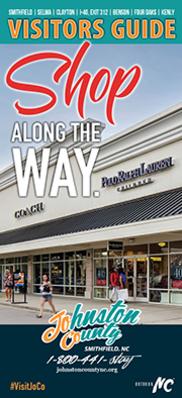JC Tourism Authority
Short history on the formation of the Johnston County Tourism Authority.
In 1987, the NC General Assembly approved HB 893 allowing Johnston County to levy a room tax. In November of that year, the Johnston County Commissioners levied a 3% county-wide occupancy tax, and the Tourism Authority was formed to promote tourism.
The legislation also established the format by which the Board of Directors was created. The Tourism Authority is a 11-member board composed of five representatives appointed by Chambers of Commerce in Benson, Clayton, Four Oaks, Kenly, Smithfield/Selma, five representatives appointed by the County Commissioners that are involved in tourism, and one ex-officio member, the County Finance Officer as the treasurer. There are Occupancy Tax Uniform Provisions established which outline how funds may be used to promote the county.
With the creation of the Tourism Authority there was a mandate in the legislation to give 50% of the tax collection for the first two years to the Johnston Community College Auditorium building fund which amounted to approximately $235,000. In addition, the tourism authority contributed $30,000 a year for five years to the Smithfield/Selma Chamber of Commerce Lee House Renovation project which created the Visitor Information Center for the county, and provided office space for the Visitors Bureau staff. So for the early years of the Tourism Authority funds were dedicated to development projects before a majority of funding was available for marketing.
Johnston County tourism revenue has been generated mainly by the leisure traveler passing through on I-95 and I-40 to other destinations. In the last several years, the Visitors Bureau has been dedicated to creating packages and tourism product to create reasons for visitors to choose our destinations for girlfriend shopping trips, golf vacations, and culinary trail packages. Current efforts continue to build awareness of Johnston County for several niche markets including agritourism, recreation, sports tournaments, destination weddings, and civil war history.












